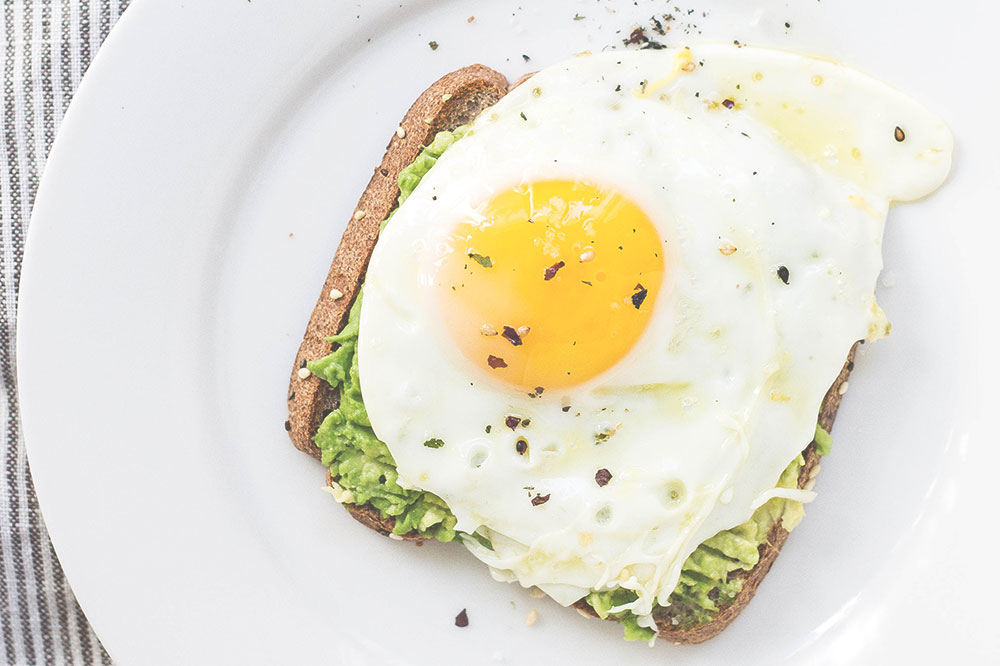Macro tracking or “tracking your macros” refers to the habit of counting or tracking how many grams of carbohydrates, protein, and fat you have per meal or per day. Here’s why you don’t need to micromanage your meals.
BY: CARA HARBSTREET, MS, RD, LD
“Macro” means macronutrient, or the nutrients that provide our bodies with energy and are consumed in gram amount (as opposed to milligram or smaller amount, as for the micronutrients).
One gram of carbohydrate has four calories. So does one gram of protein. One gram of fat has nine calories, and that’s just about all you need to know to quickly become a self-taught expert in macro tracking.
In theory, without any nutrition knowledge at all, one could become quite skillful at reading labels, doing simple math, and staying within certain parameters of how many grams of each to consume each day.
The most common method starts with estimating energy needs (calories), and divvying them up between percentages of carbohydrates, protein, and fat. From there, you’d divide by four, four, and nine and end up with the number of grams needed each day.
Tinker around with the percentages based on whatever goals you have in mind and you’re all set to go out there and crush it.
Except there’s the fact that your body doesn’t need you to track your macros.
Before we discuss why, let’s address the fact that there are instances where knowing how many grams of carbs, protein, fat you’re eating is recommended or even necessary.
Maybe you’re an athlete with performance goals who needs to prioritize protein or carbohydrates for refueling and recovery. Maybe you have Type 1 diabetes and need to know how many carbs you’re eating to accurately dose insulin.
However, let’s be very clear: eating is never that black-and-white.
There will always be exceptions and cases like these. The major difference is the mindset. A person with Type 1 diabetes doesn’t need to count carbs for the sake of tracking their macros; they do it to accurate dose a life-saving medication. An athlete doesn’t measure grams of carbs during endurance training to lose weight; they do it to make sure they don’t underfuel their body and risk injury or poor recovery.
Mindset and intent is everything.
Without diving too deep into how the body digests, absorbs, and utilizes the energy it gets from food, know this: you won’t change your health or your body with one meal or in a single day. Isolating such small increments of time is a colossal waste of time because the big picture is what really matter.
In fact, one research study that followed weight-stable individuals for a year shows that you can vary you intake from day-to-day, week-to-week, month-to-month and not see a significant change.
One key thing they also noted? Study subjects with less consistent body weight also reported more fluctuations in the energy density of their diet.
In layman’s terms: people who had a more chaotic pattern of eating (such as binge eating followed by purging/restriction) saw more changes in their weight. Of course, this is just one example, and by no means can we draw conclusions from a single study on any subject, ever.
Nutrition science is a very young field. It wasn’t until a few generations ago that we had the knowledge of what macronutrients were, what they did, and how to obtain them in our diets. But keep it in perspective what humans did for thousands of years before we knew what nutrients and calories even were.
They certainly did not spend any time wondering how many of each they were getting or meticulously tracking them in apps or journaling tools.
Here are a few more reasons why you don’t need to track your macros:
1. We don’t eat nutrients, we eat food.
Food is more than energy and nutrition. To say we eat only for those reasons is like saying people only have sex for procreation. Your relationship with food is part of mental and emotional health, which is part of overall health. If stressing about nutrients and tracking macros harms those, guess what…it’s not a healthy behavior!
2. Appetite and energy needs can and will change; this is natural AND normal.
It bears repeating because so often, we’re afraid or anxious about our appetite. We want to control our hunger, not embrace it and grant permission to respond to it. Macro tracking is one way to keep our appetite “in check”, by using the logical knowledge that we’re meeting all of our nutrition needs to convince us not to eat if hunger pops up.
3. Your body doesn’t run on continuous 24-hour cycles.
Sure, we know about Circadian rhythms. We experience a natural ebb and flow on our body clock. But there’s no internal stopwatch counting down the minutes until the clock rolls over at midnight. Our bodies don’t hit a reset button when we start a new day, so there really is no point to keeping a regimented allotment of daily nutrients.
It’s difficult to reject diet culture and begin trusting your body again. But one small step towards that is letting go of external tools like tracking your macros. If you didn’t track your food or use an app to journal every meal, how much more time would you have? How many fewer things would you have to worry about?
Devote your time and mental bandwidth away from your food, and towards other meaningful things in life.
Adapted from the original article.
HEADER IMAGE: ALISON MARRAS
Cara Harbstreet, MS, RD, LD is a Kansas City-based Registered Dietitian helping individuals jumpstart their journey to wellness. By breaking the cycle of dieting, Cara focuses on creating sustainable lifestyle changes for people who are motivated to reclaim their health. Connect with Cara over at Street Smart Nutrition.

